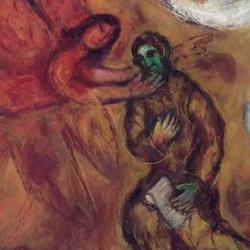According to Isaiah 56:3, sons of strangers ought not say that the Lord has separated him from the people; eunuchs ought not to think of themselves as dry trees. When eunuchs keep Sabbath, they become fruitful (vv. 4-5). The blessings to strangers and eunuchs are spelled out chiastically:
A. What sons of strangers shouldn’t say, 3
B. What eunuchs shouldn’t say, 3
B’. Blessings on eunuchs, vv 4-5
A’. Blessings on strangers, vv 6-7
Verses 3 and 6 speak of strangers who “join” themselves to the Lord. “Join” is lavah , the root of the tribal name Levi (cf. Genesis 29:34). Levi’s birth joined Jacob to Leah, so Leah hoped. And of course the tribe of Levi is made up of those who have been lavahed to Yahweh. As they carry out their mission within Israel, the lavah the members of Israel. They are the joints and sinews of the body politic.
In Isaiah, this privilege and mission is extended to sons of strangers and eunuchs.
People who have never been joined to Yahweh are made Levites, joined to God in order to be fruitful. Strangers who join themselves serve, love the name, and are Yahweh’s house servants on His mountain, just like Levites (vv. 6-7). Eunuchs joined to God are not dead wood, but sprout with blossoms and buds in the presence of the Lord, true sons of Aaron. They are given a “hand” ( yad ) – a task – in the house of God and within his walls (v. 5).
One suspects that “hand” here, as elsewhere, has overtones of sexuality. The eunuch’s “hand” becomes productive when united to God – that is, he becomes better than one who has sons and daughters. Their name will continue. When people have children, their name continues naturally into the next generation. But God’s eunuchs will have a perpetual name, just like those with sons and daughters. However mutilated they are physically, they will not be “cut off” (v. 5).
Lavah is most commonly used for financial transactions, whether lending (Exodus 22:25) or borrowing (Deuteronomy 28:12, 44). Lending and borrowing are not only about the money, nor is money simply a commodity to facilitate exchange. Money is a joiner. It has a “levitical” role, joining lenders to borrowers and borrowers to lenders. It provides the joints and sinews of a body economic.










